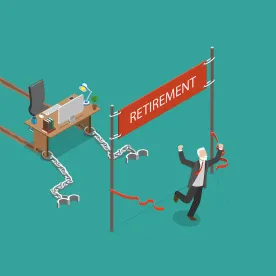As discussed in an earlier blog post, the SECURE 2.0 Act of 2022 (the Act) expanded the Employee Plans Compliance Resolution System (EPCRS), a comprehensive IRS program for correcting common qualified retirement plan failures. Plan sponsors have three ways to correct mistakes under EPCRS: the self-correction program (SCP), the voluntary correction program (VCP), and the Audit Closing Agreement Program (Audit CAP).
The Act requires the IRS to update EPCRS consistent with the Act no later than December 29, 2024. On May 25, 2023, the IRS issued Notice 2023-43 to provide interim guidance on the expansion of EPCRS.
The Act significantly expands the types of retirement plan failures that can be self-corrected under SCP. Many plan sponsors prefer SCP over the other programs because it does not involve the IRS or a fee. Under the expanded program, plan sponsors may self-correct an “eligible inadvertent failure” (EIF) unless the plan or plan sponsor is under examination by the IRS and the plan sponsor has not demonstrated a specific commitment to self-correct it. However, insignificant failures may be self-corrected even if the plan or plan sponsor is under examination and the plan sponsor has not taken action to correct the failure. The expanded program is not limited to failures that occurred on or after the Act was adopted; failures that occurred before December 29, 2022, may also be self-corrected under the expanded EPCRS.
Until EPCRS is formally updated, plan sponsors may rely on the Notice and self-correct failures if these conditions are met:
-
The plan sponsor has actively pursued action to self-correct the failure before the plan or plan sponsor is under examination (except for insignificant failures, which may be self-corrected while the plan is under examination).
-
The failure is self-corrected by the last day of the 18th month following the date the failure was identified. Except for failures related to employer eligibility failures, which must be corrected by the last day of the 6th month following the date the failure was identified.
-
The failure is not egregious, does not directly or indirectly relate to an abusive tax avoidance transaction, and does not relate to the diversion or misuse of plan assets.
-
The self-correction satisfies EPCRS’ provisions for self-correction, except these requirements in the current EPCRS procedure which no longer apply when self-correcting an EIF:
-
The plan must have a favorable determination letter.
-
The prohibition of self-correction for demographic failures and employer eligibility failures.
-
The prohibition of self-correction of certain loan failures.
-
The provisions relating to self-correction of significant failures that have been substantially completed before the plan or plan sponsor is under examination.
-
The requirement that significant failures must be completed or substantially completed by the last day of the third plan year following the plan year in which the failure occurred.
-
However, the following are some, but not all, failures that may not be self-corrected until EPCRS is formally updated:
-
A failure to initially adopt a written plan.
-
A failure in an orphan plan.
-
A significant failure in a terminated plan.
-
A demographic failure that is corrected using a method other than a method in Treas. Reg. §1.401(a)(4)-11(g).
-
Plan amendments to conform the terms of the plan to the plan’s past operations if such amendment is less favorable for a participant or beneficiary than the original plan terms.
-
A failure in an ESOP that involves section 409 (other than plan disqualification).
What Plan Sponsors Should Do:
-
Identify and correct errors before the IRS discovers them.
-
Establish practices and procedures designed to promote and facilitate compliance with IRS requirements.
-
Before filing a VCP application with the IRS, determine whether the failure qualifies for self-correction under the expanded program.
-
Keep adequate records showing when the failure was identified, the participants affected, and how and when the failure was corrected.




 />i
/>i
